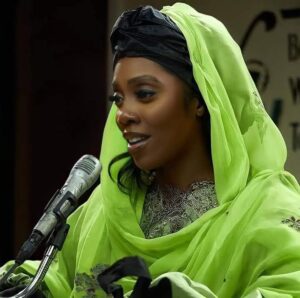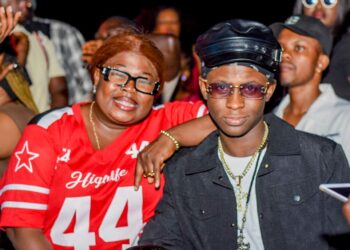Until women like Tiwa Savage are allowed to succeed without constant disrespect, the entertainment industry—whether in Nigeria or New York—will remain complicit in silencing the very voices it claims to amplify.

By Ibrahim Kegbegbe
When Nigerian Afrobeats superstar Tiwa Savage fired back at a social media critic recently, her words reverberated far beyond Lagos.
“I heard there is one useless man that is talking recklessly on the social media, setting ring light for a successful woman. I have to respect you because you look older but are you normal? Are you ok? Are you running crazy? Did anyone pour shit on you?” she said, dragging a commentator who accused her of being part of the “evil” in the industry because she never gave upcoming female artistes a verse.
Her anger may have sounded abrasive, but at its core was a truth that resonates not only in Nigeria but across the global entertainment landscape: successful women in music are routinely disrespected, scrutinized, and burdened with expectations in ways their male counterparts are not.
The Double Standard of Collaboration
Tiwa’s critic claimed she has not “given” enough opportunities to younger female artistes. But collaboration in music is not charity. It is a business decision—shaped by contracts, timing, creative alignment, and sometimes pure chance.
Yet, women in music are often judged differently. In Nigeria, Tiwa is attacked for not “lifting” every new artiste. Meanwhile, global stars like Beyoncé or Rihanna are not criticized for choosing their collaborations carefully. Their empowerment is measured by their craft, their business empires, and their cultural influence—not by how many verses they hand out.
So why does the African woman bear the heavier burden? The answer lies in deep-rooted cultural expectations: women are assumed to be nurturers, constantly giving back, constantly proving they belong. Men are allowed to succeed as individuals; women are expected to succeed as caretakers of everyone else’s dreams.
READ ALSO:Behind 1004’s Walls: Lagos’ Story of Light and Darkness
A Global Pattern of Disrespect
This culture of disrespect is not unique to Nigeria. Across the world, female entertainers walk a tighter rope.
In the U.S., Taylor Swift has been accused of being “too calculated” whenever she asserts control over her career, while male artists are praised as “business savvy.”
In the U.K., Adele faced tabloid attacks for her body and private life rather than her artistry.
In South Africa, female performers from Sho Madjozi to Moonchild Sanelly have been publicly shamed for their looks and choices, overshadowing their contributions to African music.
Tiwa Savage’s outburst is thus part of a larger narrative: women in entertainment are constantly forced to defend not just their art but their very right to exist without harassment.
The Social Media Factor
What makes the Nigerian context particularly sharp is the volatility of social media. Platforms that should amplify music have become spaces where anyone with a phone can diminish a woman’s legacy with a reckless comment.
For Tiwa, this is not the first time. She has faced online abuse about her motherhood, fashion, and even the right to celebrate her successes. This mirrors the broader challenge of mental health pressures facing global celebrities—especially women, who are more frequently targeted with gendered insults.
Why Women Carry a Heavier Burden
The assumption that Tiwa Savage must automatically mentor or feature upcoming female artistes reflects an old cultural bias: women must always be “giving.” While mentorship and collaboration are valuable, they cannot be coerced.
The irony is that Tiwa Savage has already broken barriers for others simply by existing at the top of the Afrobeats world. She has toured international stages, signed global deals, and opened the door for African female artistes to be taken seriously in a male-dominated genre. Her success itself is a form of empowerment.
Lessons for the Global Entertainment Industry
The Tiwa Savage episode invites deeper questions for the global entertainment industry:
Why do we normalize the public shaming of successful women?
Why are female stars judged more harshly than men for their choices?
And why do societies—whether in Lagos, Los Angeles, or London—still struggle to accept women as autonomous artists rather than caretakers of others’ ambitions?
The answers point to a need for systemic change: more intentional investment in female talent, stronger protections against online harassment, and a cultural shift that respects women’s autonomy.
READ ALSO:Nigeria vs Nigeria: Super Eagles’ Own Goal Comedy in World Cup Qualifier
Tiwa Savage’s sharp question—“Are you normal?”—was aimed at one reckless critic, but it echoes more widely. It challenges the culture of disrespect that women in entertainment face daily.
As Afrobeats rises as a global force, its treatment of women will be closely watched by the world. Respecting female artistes is not just about fairness—it is about sustaining an industry that claims to celebrate creativity, diversity, and freedom.
By Ibrahim Kegbegbe
Journalist and Public Affairs Analyst | Lagos, Nigeria
















